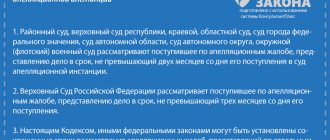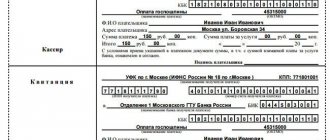Consideration of civil cases is the responsibility of district courts. The decisions taken on the claim do not always satisfy the participants in the proceedings. The verdict can be appealed in 2021. However, it is necessary to comply with the deadline for filing an appeal in a civil case . Missing a period without valid reasons will be grounds for refusal to consider the application. Therefore, it is important to act quickly. We will talk further about which organizations in the Russian Federation are involved in considering appeals, the review procedure, as well as the period and procedure for action in the event of its expiration.
Where to send a complaint
It is necessary to write an appeal and submit it to the authorized body before the verdict enters into legal force. You need to contact the court of first instance. Even if a person immediately files an appeal with the authority that will subsequently consider them, the papers will still be forwarded to the institution where the initial proceedings took place. If the complaint is accepted, it will be forwarded to the Regional Court. This is where the appeal will be reviewed by a panel. The procedure will involve 3 people led by the presiding judge.
Deadline
The appeal is submitted to a higher authority within 1 month from the date of the court decision in the civil process.
The norms are enshrined in the following articles of the Code of Civil Procedure of the Russian Federation:
- 107;
- 108;
- 109;
The period of appeal in civil cases begins to be calculated from the moment that follows the day of the final reasoned decision in the case. The appeal period then expires.
A similar rule applies if the complaint is filed against a decision made after consideration of the appeal. The first period is extended. It is 6 calendar months. An appeal to the cassation authority is permissible within six months. This function is performed by the Presidium of the regional court.
In practice, a decision may not be made immediately. The law allows you to postpone its adoption for up to 5 days. In some situations, the appeal period is reduced to this period.
Video
Reasons for returning the complaint
The complaint may be left without action and given time to correct the shortcomings. This may happen in the following cases:
- the state duty has not been paid or has been paid incorrectly;
- there are no details and information that are mandatory;
- there is no information that copies were distributed or given to participants in the process;
- the document is not signed or there is no power of attorney for the person who signed it.
In all these cases, the court, within five days after receipt, must make a determination to eliminate the violations and provide a reasonable period for their elimination.
It can also be returned if:
- the conditions specified in the determination to eliminate violations have not been met and the deadline has expired;
- the deadline for appealing a court ruling or decision has expired, and the complaint does not indicate a request for its extension, or there is no evidence for its extension and it is refused;
- the application was submitted by a person who does not have the right to do so;
- the person who filed the application himself requests a withdrawal, but the case has not yet been submitted to the court for consideration.
The time to file an appeal has expired
It is not always possible to meet the allotted period. In this situation, it is necessary to file a petition to restore the time limit for filing an appeal. It is imperative to indicate the reasons that did not allow the complaint to be sent in accordance with generally accepted standards. The appeal is carried out according to the rules enshrined in Article 322 of the Code of Civil Procedure of the Russian Federation.
You can submit your appeal within the allotted time by mail. If the complaint was submitted to the organization’s office one day before the expiration of the established period, the procedure is not considered overdue. The paper will be accepted for consideration. The date of sending the appeal is determined on the basis of a postal receipt, stamp or other details confirming the date of sending. If the court considers that the person was unable to apply within the prescribed period for valid reasons, he will be reinstated.
Article 329 of the Code of Civil Procedure of the Russian Federation. Resolution of the appellate court (current version)
The reasoning part of the appeal ruling must indicate the circumstances of the case established by the appellate court, the court's conclusions based on the results of consideration of the appeal, presentation; the reasons on which the court came to its conclusions, and reference to the laws that guided the court. The current legislation directly instructs the court, when considering cases, to be guided by the Constitution of the Russian Federation, international treaties of the Russian Federation, federal constitutional laws, federal laws, regulatory legal acts of the President of the Russian Federation, regulatory legal acts of the Government of the Russian Federation, regulatory legal acts of federal government bodies, constitutions (charters), laws, other regulatory legal acts of state authorities of the constituent entities of the Russian Federation, regulatory legal acts of local government bodies. The choice in each specific case of the rules of law to be applied when considering a civil case is made by the court based on its actual circumstances. The reasoning part of the appeal ruling may contain references to decisions of the Constitutional Court of the Russian Federation, the Plenum of the Supreme Court of the Russian Federation on issues of judicial practice.
———————————
See: Determination of the Constitutional Court of the Russian Federation dated March 29, 2021 N 598-O “On the refusal to accept for consideration the complaint of citizen Olga Mikhailovna Golubyatnikova about the violation of her constitutional rights by the provisions of paragraphs 3 and 9 of Article 12, paragraph 1 of Article 28 of the Federal Law “On compulsory social insurance against industrial accidents and occupational diseases,” as well as paragraph 6 of part two of Article 329 and Article 330 of the Civil Procedure Code of the Russian Federation.”
As follows from the provisions of Part 3 of the commented article, which guarantees the protection of his rights to the appellant, the appellate court in the reasoning part of the appeal ruling must indicate the reasons for which it leaves the appeal complaint, presentation without satisfaction, as well as the reasons for which the arguments of the appeal , submissions are rejected. It should be borne in mind that if the appeal or presentation contains several arguments that justify the cancellation of the appealed decision, then the appellate court in the reasoning part of the appeal ruling must set out the reasons for rejecting each of the arguments.
Example: an appellate court, considering an appeal in which E. asked for the cancellation of a court decision in absentia due to failure to notify E. of the consideration of the case on the merits, as well as due to the discrepancy between the period for which the plaintiff presented invoices and the period of debt declared by him , etc., leaving the complaint without satisfaction was motivated by the fact that the court of first instance checked the calculation presented by the plaintiff and considered it arithmetically correct. The reasons for rejecting the remaining arguments of the appeal are not given in the appeal ruling. Considering that in order to properly resolve the dispute that arose between the parties, it was necessary to establish the amount of the defendant’s debt, and the arguments of the appeal in this part were not considered by the judicial panel on the merits, the Presidium of the Vologda Regional Court, by its Resolution of October 17, 2021 N 44G-35/2016 Appeal The ruling was overturned and the case was sent for a new appeal hearing.
The operative part of the appeal ruling, as noted in paragraph. 4 clause 41 of the Resolution of the Plenum of the Supreme Court of the Russian Federation dated June 19, 2012 N 13, must contain the conclusions of the appellate court on the results of consideration of the appeal, presentations within the limits of the powers granted, and, if necessary, an indication of the distribution of legal costs, incl. expenses incurred in connection with filing an appeal or presentation (Part 4 of the commented article). The operative part of the appellate ruling may vary in content depending on whether the case was considered according to the rules of a full or incomplete appeal. Thus, the operative part of the appeal ruling issued following the consideration of the case according to the rules of full appeal must contain an indication of the cancellation of the court decision of the first instance court, the conclusion of the appellate court on the stated requirements (satisfaction or refusal to satisfy the stated requirements in whole or in part, termination of proceedings in the case or leaving the application without consideration in whole or in part), as well as an indication of the distribution of legal costs.
Although the legislator does not focus attention on this, the appeal ruling, like all other judicial decisions that have a procedural form, is drawn up in writing and signed by the judge during a single review of the case or by all judges during a collegial review of the case, including the judge who held a dissenting opinion .
3. As noted by the Constitutional Court of the Russian Federation, the provisions of Part 5 of the norm in question, fixing the procedure for the entry into force of the decision of the court of appeal, contribute to the achievement of the objectives of civil proceedings for the correct and timely consideration and resolution of civil cases and are a procedural guarantee of the right to judicial protection.
———————————
See: Determination of the Constitutional Court of the Russian Federation of February 25, 2021 N 381-O “On the refusal to accept for consideration the complaint of citizen Raisa Egorovna Kryuchkova about the violation of her constitutional rights by part five of Article 329 of the Civil Procedure Code of the Russian Federation.”
The commented norm is fundamentally important for the entire course of legal proceedings, since, as follows from the content of the part under consideration, from the moment the appellate court announces the appellate ruling in the courtroom, it comes into force immediately. It should be borne in mind the position of the Plenum of the Supreme Court of the Russian Federation, which indicated in paragraph. 3, paragraph 41 of the Resolution of June 19, 2012 No. 13, that the announcement at the court hearing of the appellate court of only the operative part of the appeal ruling and the postponement of drawing up a reasoned appeal ruling for a period of no more than five days does not extend the date of its entry into legal force. At the same time, the judge presiding over the court session must explain when and in which court the persons participating in the case can familiarize themselves with the reasoned appeal ruling.
The date of entry into force of the appeal ruling is a legal fact entailing a number of legal consequences. First of all, the legal force of an appeal ruling means the possibility of its execution regardless of the possibility of exercising the right of persons participating in the case to a cassation appeal. The entry into force of an appellate ruling is of fundamental importance for the material and legal relations to which it extends its effect.
Example: a higher court overturned the decision of the court of first instance regarding the amount of collection of interest for the use of someone else's funds, since the court of first instance incorrectly determined the start date for the collection of interest, focusing on the date the decision of the court of first instance entered into legal force. Meanwhile, as can be seen from the case materials, this decision was appealed and the Appeal ruling of June 20, 2014 was left unchanged, and therefore, the date of entry into force of the district court’s decision is June 20, 2014 (see. more details Appeal ruling of the Moscow City Court dated August 16, 2021 in case No. 33-31335/2016).
From the day following the day the appeal ruling is issued, the persons participating in the case have the right to appeal the appeal ruling in cassation and the calculation of the six-month period for appealing court decisions that have entered into legal force begins. At the same time, as stated in paragraph 8 of the Resolution of the Plenum of the Supreme Court of the Russian Federation dated December 11, 2012 No. 29 “On the application by courts of the norms of civil procedural legislation governing proceedings in the cassation court,” if, after issuing an appeal ruling, the appellate court considers the appeal , submissions received from other persons for whom the period for filing an appeal was restored, submissions, the six-month period for appealing court decisions that have entered into legal force should be calculated from the day following the day of the adoption of the last appeal ruling. If the appellate court issues an additional appeal ruling, the six-month period for cassation appeal of the main appeal ruling and the additional appeal ruling begins to run from the day following the day the additional appeal ruling is issued. At the same time, if the appellate court refuses to satisfy the application for an additional appeal ruling, the period for filing a cassation appeal is calculated from the day following the day the main appeal ruling is issued.
It should be noted that decisions of the appellate court made on its own initiative to correct a clerical error or obvious arithmetic error, to satisfy or refuse to satisfy an application for clarification of the appeal ruling, which changed the decision of the court of first instance or made a new decision, as well as to satisfy or on the refusal to satisfy an application, a motion to revise an appeal ruling due to newly discovered or new circumstances, come into force according to the general rule enshrined in the commented norm from the moment of their adoption. However, it should be borne in mind that this situation means that it is impossible to appeal these determinations on appeal, since they have entered into legal force, despite the fact that the listed issues were not the subject of consideration in the court of first instance. In view of this, these rulings of the appellate court can only be appealed in cassation, since the appellate court does not have the right to consider complaints against court decisions that have entered into legal force.
Rules for filing a complaint in court
In order for the authorized body to agree to consider the appeal, it must be drawn up in accordance with the requirements of current legislation. The form must indicate the place of residence of the person submitting the application. The full name is displayed here. The applicant must sign. Submission of documents by an authorized representative is acceptable. However, in this case a power of attorney will be required.
When filling out the paper, you will need to write down the name of the appellate court. Identification of the authority that made the original decision is considered an error. Additionally, the requirements are stated and their legality is justified. If necessary, the complaint can be supplemented with evidence. It will be necessary to reflect the reasons why the person did not present new arguments to the court in advance. Lastly, the papers attached to the appeal are recorded. If the application to the authorized body requires payment, the application must be supplemented with receipts. If an application is made to resolve non-property issues, the amount of the state duty can be reduced by 2 times.
Who has the right to appeal a court decision?
Who has the right to appeal a court decision:
- plaintiff;
- defendant;
- legal representatives of the parties;
- the prosecutor who participated in the trial;
- a person who is not a party to the case, whose rights and obligations were affected by the court;
- a third party involved in the case whose interests were affected;
There are cases when people who are not parties to the process may suffer from the court's conclusion. For example, persons registered in an apartment, when a court decides to transfer ownership rights from one person to another.
Objections to the appeal and return
If other participants in the proceedings have objections to the direction of the appeal, they have the right to record them in writing and submit them to the authorized body. The paper is supplemented by a package of documents. This is done so that the court can assess the legality of filing a complaint.
Video
The person filing the appeal has the right to have it rejected. However, the procedure can only be carried out until the corresponding decision is made. The refusal must be justified in writing. He is sent to the appellate court.
Grounds for appealing a court decision
Procedural grounds
There is a strict procedure in court proceedings. All actions of the parties, as well as the persons involved in the case, are described in detail in the Code of Civil Procedure (CCP). Violation of the rules of the Code of Civil Procedure is a reason to hold an appeal hearing even if the parties to the proceeding do not request it.
The procedural basis may be:
- failure to comply with legal process;
- non-compliance with the law or its incorrect interpretation;
- missing or failing to meet deadlines;
- lack of logic in the judicial determination.
Procedural grounds are much more common, and are essentially a way to change a decision due to court errors in the order of the case. The essence of the matter will not change, but there is an opportunity to ease the fate of a party in the process or change the definition for third parties. There are errors due to which the case can be canceled almost immediately and will be considered again. Such cases are:
- illegal composition of the court when considering the case (absence of necessary persons or presence of extra judges and their assistants);
- lack of notification to the persons involved in the case;
- consideration of the case in another language, if at least one person is not familiar with it and there is no translator;
- no minutes were kept;
- the judge did not go into the deliberation room before making a decision;
- the judge did not sign, or another person signed it.
Material bases
Substantive grounds involve misinterpretation of evidence or the law. Checking whether the decision made is in accordance with the law on material grounds is possible only at the request of the party; the judicial authorities themselves do not have the right to initiate such a case.
When appealing a court decision, you cannot provide new documents or make other demands. An exception exists only for those persons who were not involved in the first case and it is they who file the complaint. Such an example could be the consideration of inheritance cases, when other heirs were not involved and they did not know about the first trial, but file an appeal.
Note! If other evidence appears, then it is necessary to consider the case anew, based on newly discovered circumstances.
There is one more exception - the provision of papers that could not be obtained at the first consideration, but the court was aware of them. For example, if a party filed a motion to include a document or request it, but the judge issued a ruling without it.







